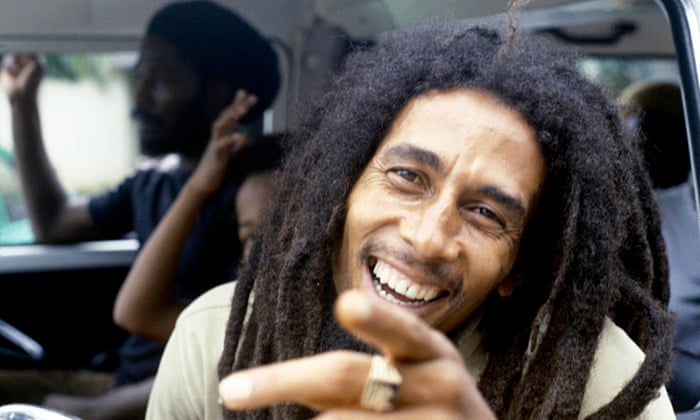If you are an FM radio buff like me, you’ll, tomorrow, notice a preponderance of reggae music gushing from a host of them, anywhere in Nigeria and could be in many parts of the world. Most of the reggae music would however be from the stockpile left behind by Bob Marley. Other reggae musicians will have to go to sleep tomorrow because the day will be celebrated as the 40th Anniversary of Bob Marley’s transition to the next world. Reggae men don’t die they just transit.
It is a great pity that whenever reggae is mentioned what comes to mind would be a guitar player, red-eyed, shaggy-bearded, bearing on his head an unruly and untidy dreadlocks. He would most likely be covered in a blaze of white fog emanating from cannabis smoke. Bob Marley who died at the height of his popularity, aged only 36 in 1981, typified all that but even more. Bob Marley wore untidy dreadlocks with shaggy beards. He had red eyes. He smoked cannabis and celebrated its use in his songs. But he was a great artist whose songs and popularity across generations are a lasting testimony to his genius. He was equally great as a songwriter as well as with his instrument for he was a versatile rhythmic guitarist.
Many famous singers suffer from such stigmatisation. Tupac Shakur, the American iconic rapper who belongs to a generation much younger than mine, would be in a similar mould. Despite 2pac’s overwhelming influence on the hip hop genre, whenever his name is mentioned what comes to mind is the American shot-me I-shoot-you, gangster, culture that unfortunately consumed him at barely the age of 25. As for reggae, not all the singers fell into that fringe. Bob Marley’s worthy contemporaries, Jimmy Cliff and Johnny Nash were clean-cut ordinary guys.
Even after 40 years now, Bob Marley is seen and regarded as the leading exponent of reggae music, an essentially Jamaican creation of the late 1960s Bob Marley together with the equally legendary Peter Tosh was part and parcel of reggae’s early development and its export to the US and Europe before coming to Africa in the early 1970s. Bob Marley sang from the heart espousing the causes of justice and liberation. He was a Rastafarian, a fringe religion that has Africa as its centrepiece with the deposed Ethiopian emperor Haile Selassie as its deity. Rastafarians, now numbering about a million but mostly living in Jamaica retain the forlorn hope of returning to the homeland, Africa. It was these religious outpourings that manifest in many of his songs particularly those about Africa.
The songs about liberation and justice were particularly appealing to African youths of the period yearning for the emancipation of a large part of the continent then under colonialism. In the 1970s, many African countries mostly in the south and east including Namibia, South Africa, Zimbabwe, Mozambique, Angola were either under the jackboot of colonial rule and or apartheid. Bob Marley sang about the struggle for emancipation in albums such as The Rastaman Vibration released in 1976. The album featured War, a single that dealt mainly with the apartheid regime in South Africa. He followed this up with the Survival (1977) album, which was even heavier with Afro-centric themes having songs such as Africa Unite, Wake Up and Live, Survival and Zimbabwe. That was a period leading to Zimbabwe’s independence and Bob Marley even became a major item of the celebrations in Harare where he performed in person at the Rufaro Stadium on independence day.
I was a late convert to Bob Marley. When I arrived at the Samaru campus of ABU Zaria, in 1972, the musical trend among students had shifted decisively to black singers mostly coming from the US and Jamaica. Singers such as James Brown, Isaac Hayes, Barry White, Al Green, Jimmy Cliff, Johnny Nash ruled the waves in the campus. If Bob Marley was current, then, I didn’t take notice. I only began to take notice in the mid-70s after graduation when I was undergoing the NYSC programme in Lagos. During the orientation, we were camped at Yaba College of Technology, which was a walking distance from Fela’s Kala Kuta Republic, which is a few months would be burnt down by soldiers from the nearby barracks. Many visits to the KalaKuta Republic got me enamoured with Fela’ s Yabis, which inevitably was a short step to appreciating the works of the likes of Bob Marley.
Today, 40 years after he transited, Bob Marley never seem to cease to entertain and inspire across all ages. He was even said to have become more popular after death. Legend a compilation of his best songs released after his death in 1984 sold over 25 million copies and is reputed to be the best selling reggae album of all times. Exodus (1977) the album that propelled Bob Marley to worldwide recognition was declared the best album of the 20th Century by the Time magazine in 1999. And BBC had declared the single, One Love, which is part of the Exodus album as the song of the millennium.

 Join Daily Trust WhatsApp Community For Quick Access To News and Happenings Around You.
Join Daily Trust WhatsApp Community For Quick Access To News and Happenings Around You.


